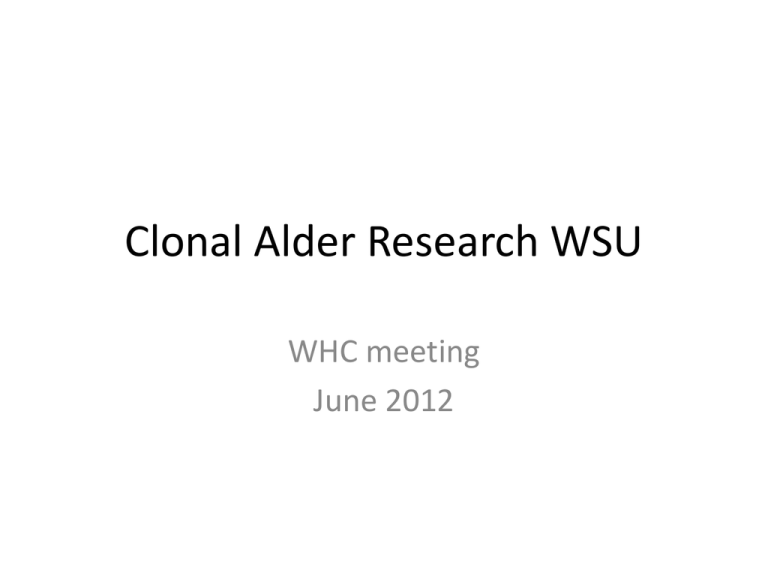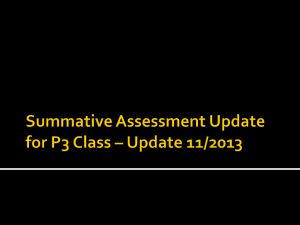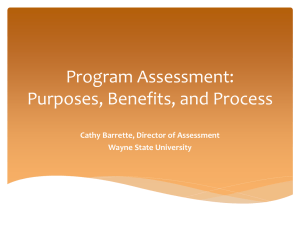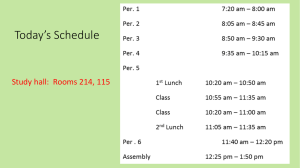Clonal Alder Research WSU - Washington Hardwoods Commission
advertisement

Clonal Alder Research WSU WHC meeting June 2012 Current Standing of the Alder Clonal Work • As of May 2011, the Alder clonal research carried out at Weyerhaeuser Northwest Hardwoods was transferred under agreement with WSU, with certain provisions, so the program could continue and develop new clones. • As the program had been partly based at WSU there was very little disruption to the program • WSU is currently looking at ways to commercialize the clonal alder program and its broader use as a feedstock supply for biomass for energy production • WSU will also continue to develop new clones for both forestry and agricultural land but will also place some emphasis on the development of alder clones and associated frankia strains that can be used to produce short rotation energy crops on marginal lands. • The alder program is running concurrently with the hybrid poplar program formerly run by Jon Johnson. Current Standing December 2011 Alder • • • • • • • Original emphasis on “good” alder production sites – changed in 2007 to poorer coastal sites and to include agricultural site selections Emphasis on coastal zone at Start of 2008 accelerated program to selections for Coastal and Agricultural sites at the end of 2009 (inland and coastal selections again) Frankia testing; first field trial 07 on selected coastal zone selections continuing to collect and bulk Total program – 382 clones captured (141 coastal) (just under 650 collected) – 253 in field trials 2010 – 31 production clones identified – cold and disease tested 25% plus on growth – Over 35 000 plants out in various trials (clonal, size, age, frankia etc) Wood properties work ongoing PCR work completed for production clone protection We have new clonal selections in 2011 from the Vancouver island provenance selections and axilliary cuttings are currently being grown in the greenhouse – these are the first all WSU clones Current WSU Alder Work • We have collected 50 new selections of the best alder families from the Provenance trials planted at Longview • Axils were forced to break on the branch stems and these were elongated and rooted. These will become the parent plants for producing trial material. Frankia have been collected from the roots of the best 20 of these clonal selections. Frankia Collections • We currently have 40 Frankia collections of which 35 are growing in pure culture in acid washed sand planted with 3 to 5 different alder clones. The Frankia which shows the best growth and the most aggressive root colonization is selected for inoculum for new plants. • We currently have a new selection of 20 Frankia lines from the latest clonal selection and we are working on getting these into culture Alder Breeding • One of the agreements we have with Weyerhaeuser is to initiate new superior populations of Alder from which new clones can be selected. We created relatedness maps from RFLP “fingerprints” of our best clones and chose the best growers that were not related directly to each other and created a crossing matrix to produce seeds to make a new selection population. We have just completed all of our crosses and these will be planted out in 2013 Alder Production Population Clone dbh gain W clone 1 1.42 W clone 2 1.34 W clone 3 1.33 W clone 4 1.33 W clone 5 1.30 W clone 6 1.29 W clone 7 1.25 W clone 8 1.24 W clone 9 1.23 W clone 10 1.23 W clone 11 1.21 W clone 12 1.19 W clone 13 1.16 W clone 14 1.16 W clone 15 1.16 W clone 16 1.13 W clone 17 1.13 W clone 18 1.12 W clone 19 1.05 W clone 20 1.04 ht gain 1.48 1.16 1.41 1.18 1.2 1.19 1.14 1.39 1.14 1.14 0.98 1.16 1 1.36 1.17 1.21 1.26 1.2 1.23 1.33 top 10 clones dbh gain ht gain 1.296 1.243 top 20 clones dbh gain ht gain 1.2155 1.2165 • The growth analysis was kindly carried out by A. Dobkowski of Weyerhaeuser and approved by D. Marshall. • These clones are being compared to the average seedling on DF 130 and 140 sites • The best clones on agricultural sites are outperforming these growth rates • The best clone on WSU farm 5 has grown at 1 inch per year diameter for the last 9 years These Clones are Selected for: Ring by Ring Specific Gravity Profile for Tree No. 35 Specific Gravity (O. D. wt./green vol.) 0.55 0.50 0.45 0.40 0.35 0.30 Bottom height 0.25 8 7 6 5 4 3 2 1 1 2 3 4 5 6 7 8 Ring number from pith (side 'A' on the left) All of the above clones have been tested for cold and drought tolerance, disease resistance and uniformity of wood properties and lumber characteristics. We have permission to continue working with Weyco to test wood quality and will continue to do field trials on WSU property and anyone in WHC that wants to volunteer and sign a confidentiality agreement Alder Production for Commercial Use • Part of the agreement with Weyerhaeuser was to start to look at commercialization of the best clones whilst maintaining the program and selecting new clones. We are currently starting production on the best clones. Alder Cuttings for Production Picture of alder cuttings to be made available next year through the WHC. These cuttings were placed in mid April, some for parent plants for future production, some for clonal trials and around 6000 for sale in 2013 Current standing December 2011 Poplar • Goss Farm currently has the 50 original Northwest P. trichocarpa. These will be maintained and cuttings taken to establish a new holding area. • A small stand of the Vancouver Island poplars planted in 2006. Maintain and measure. •A,B, C and E clonal trials planted in 2001, 4, 5 and 6. These will be maintained and new selections made. • Stool bed with approx. 100 triploid clones and some family 335 planted in 2005. Material from this bed will be cloned and moved to a more productive site and material will be readied for commercialization . Some of this material will be used for breeding. • The remnants of some Rust resistant P. trichocarpa that were planted in 1999. We will be able to rehabilitate some of these plants. •We are starting to force the more mature trees to form basal shoots so that we can clone them and then plan to fell the original trees so we can easily start using them in future breeding. • We are setting up new stool beds of clones of commercial interest in 2012 and these should be ready for first production in 2013 and full production in 2014. Time to Commercialization • Time to commercialization of both the alder and the poplar is dependent on the final numbers needed. We currently have material to produce around 50K selected alder clones and around 15K good commercial poplar clones. • With the new clones coming online we will put most of the alder production back into parent plant production and then push for major production in 2013/14 providing the production facilities are in place • The new stool beds of the promising Jon Johnson clones and B and C series clonal selections will be grown over the winter months and placed out into new stool beds in the spring. These will be ready for minor production in 2013 or early 2014 • We are looking at earlier selection criteria methods such as genetic markers and phenomics and also at increasing production through different planting paths (size, frankia inoculation, tissue culture hedges etc) for agricultural site plants versus forestry site plants. We will attempt to use these to get plants into production faster. WSU Marketing/Commercialization Efforts for Red Alder Background: Red alder is the most common hardwood in the PNW and highly sought after for commercial wood-making. A red alder forest is home to a diverse community of wildlife. Deer, elk, horses, cattle, and sheep all eat the leaves, twigs, and buds of the tree. The trees are important in N-fixing with leaf litter contributing to future forest growth. The trees can be used as riparian buffers to reduce stream bank erosion, reduce erosion of steep slopes, enhance aquatic environments, and protect water quality. Red alder wood is high-quality hardwood that has a fine, even texture and a cherry-like grain. Products made from red alder include wooden dishes, paneling, furniture, brush handles, plywood, veneers, pulp, firewood, and even fiber-based products such as tissue and writing paper. Target Market Unfortunately, we can’t affect demand for products made with red alder. However, we can try to make those who grow red alder aware that Washington State University (WSU) is in the process of developing high quality red alder clones from Weyerhaeuser clonal material which: grow faster, survive better, produce higher quality wood, and can be grown on marginal land. We can also try to make those who provide trees for non-manufacturing purposes aware that our trees have high growth and survival rates, and can be planted on marginal land. By early 2013, WSU will have approx. 6,000 viable red alder seedlings for sale, and a significant base of parental stock for future seedling production. There will also be material available for testing. Target Market (cont’d) Since most hardwood nurseries produce seedlings from seed, and oftentimes under advance contracts, and given that WSU uses asexual propagation to produce the higher quality red alder plants, we don’t think hardwood nurseries will be interested in producing seedlings for sale on their own under WSU license, at least not initially. Asexual propagation is also more complicated and more expensive, and takes some practice to perfect. So how can we create demand for WSU’s new, high quality seedlings? We think we can do so by targeting the growers of red alder, those who produce for the makers of the final products, and for other uses. We think we can demonstrate the value of higher quality plant material to these people. At some point, we hope to interest the nursery community to take on the asexual production of new WSU clones under license, as discussed below. Making WSU Seedlings Available to Growers/Others As we said earlier, in early 2013, we will have approx. 6,000 viable red alder seedlings available for sale, as well as a significant base (30+ clones) of parental stock for future seedling production, and seedlings available for testing. We encourage offers to purchase the initial 6,000 seedlings, interest in licensing parental stock for propagation and seedling sales, and interest in testing our clonal material. In an attempt to jumpstart demand for the new seedlings, here are some options we are considering: We may produce seedlings at the WSU Puyallup Research and Extension Center and sell them directly to interested land owners and forest managers. We may get seedlings produced under contract and sell them ourselves, or license the contractor to sell them, in which case we would share proceeds gained from the sale of the seedlings with the contractor. Seedling Availability (cont’d) As a variation to option #2, we would like to work specifically with hardwood nursery contractors who are interested in eventually licensing the WSU clones, teach them our asexual propagation techniques, contract with them initially to produce seedlings, with the ultimate goal of having them, under license with WSU, propagate their own plants, sell them, and pay us a small percentage of sales or a per-tree royalty. As another option, perhaps with the assistance of the WA Hardwoods Commission, we could try to set up a grower cooperative effort to facilitate the taking of orders for WSU red alder materials and getting such orders filled. Where Do We Go from Here? Part of our marketing plan involved being here today to tell you about—and hopefully interest you in—our new, high quality red alder clone/seedling development program. We hope to hear from you with your comments and suggestions. If you have some ideas on how to proceed, we want to hear them. If you’re interested in working with us to sell our 6,000 seedlings or do contract seedling production and/or sales, call us. We plan to advertise our efforts in the near future through some form of print media and/or WSU publications. Contact Information If you have any comments, questions, or suggestions on how to make this red alder venture a success and/or want to be a part of it, please contact: Barri Herman, PhD WSU Hardwoods Breeder 2606 W. Pioneer Puyallup, WA 98371-4998 tel: 253-445-4594 (wk) tel: 425-516-2038 (mobile) e-mail: barri.herman@wsu.edu or Tom Kelly Technology Manager WSURF 1610 NE Eastgate Blvd., Suite 650 Pullman, WA 99163 tel: 509-335-1210 kellytj@wsu.edu








